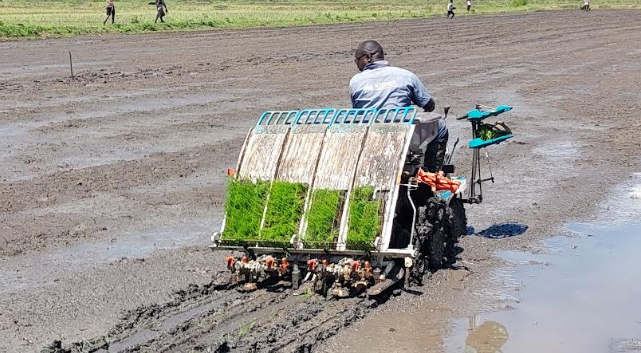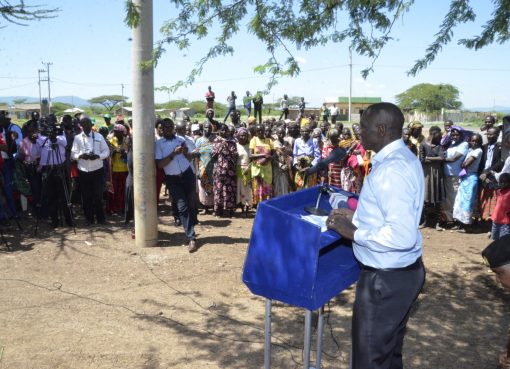The collaboration aims to address the nation’s rising rice deficit and enhance food security by modernising the agricultural sector.
The partnership between KiliMOL and the National Irrigation Authority (NIA) targets to scale up rice production in the country and slashing the huge deficit, currently standing at 75 per cent, which costs taxpayers Sh42 billion annually in imports.

Following research and trials in the country, mechanisation has been identified as a key strategy in scaling up rice production from 250,000 metric tonnes to 1.2 million metric tonnes to satisfy the domestic market.
According to KiliMOL Agricultural Engineer Simon Mutua, the partnership has seen the introduction of six-row and four-row rice transplanters to address gaps in production, enhance efficiency, and cut costs involved in planting the crop manually.
The machinery currently in operation at the Mwea Irrigation Scheme in Kirinyaga County has already posted tremendous results, with farmers recording an increase in production from 25 bags to 40 bags per acre.
He attributed the increase to the efficiency of the machinery, which has zero breakages and zero root disturbance, guaranteeing maximum crop survival, compared to manual planting, where some of the seedlings break, while others die due to root disturbance affecting production.
At the same time, mechanised planting was very accurate on spacing and depth, which has proved to be very effective in controlling wilting, which results in the death of seedlings, thus affecting the overall production.
Speaking during a demonstration of the new technology to farmers at the Ahero Irrigation Scheme in Kisumu County, Mutua said mechanised planting was cheaper than manual planting, with the four-row transplanter only consuming four litres of petrol per acre, which translates to about Sh700.
Manual rice planting, which is widely used in the country, he added, was expensive, with up to 18 people required to plant an acre per day, which translates to about Sh9,000.
On the contrary, mechanised planting requires a maximum of three people, with the machines capable of planting one acre in one and a half hours, hence saving farmers time and money.
“What this means, therefore, is that a farmer can plant more acres within a day for less. This technology will allow farmers to plant rice more quickly, with greater accuracy, and at a fraction of the cost compared to traditional methods,” Mutua said.
Consequently, manual labour in the rice sub-sector was rapidly declining, with very few youths showing interest in the crop due to the tedious nature of the exercise, meaning mechanised planting was the way to go in moving the country to self-sufficiency in rice production.
“The average age of our farmers is about 60 years. They may not have that energy required to plant the crop. At the same time, the youths are not interested in wading into mud to plant the crop. With this technology, which is very successful in Pakistan, Japan, India, and other leading rice producers, we expect to triple our production to meet the rising demand for the commodity,” he said.
To scale up uptake of the new technology, KiliMOL has been allocated space at the NIA irrigation schemes to demonstrate and train farmers on the research fields, with plans underway to avail the machinery across the country.
Some 20,000 farmers have so far been onboarded, with efforts on course to reach an additional 10,000 of them across the rice-growing regions by the end of this year.
Ahero Irrigation Scheme Operational Research Officer Daudi Aleri said the machinery was a game changer in reducing the cost of rice production in the country.
This, he said, was in line with the government’s plans to boost food security with an overall objective of becoming self-sufficient in rice production to save the huge budget involved in importing the cereal.
Aleri added that the technology was set to double production and increase acreage under cultivation at the scheme, creating more job opportunities along the rice value chain.
“We expect to see an increase in the actors along the rice value chain. This means increased trading at our various markets and centres, more food, and more jobs for the youths,” he said.
Japheth Asugo, a farmer at the Ahero Irrigation Scheme, lauded the government for the initiative that will not only reduce the cost of production but also renew interest in rice farming, which is the mainstay for farmers in the area.
“Farmers spend a lot of time and money to plant an acre, but with this technology, which has proven to be cost effective, we expect to reap maximum benefits,” he said.
Asugo urged the Ministry of Agriculture and partners to avail more machines in the scheme to scale up the uptake of the technology and bring onboard more farmers to boost food production.
By Chris Mahandara





